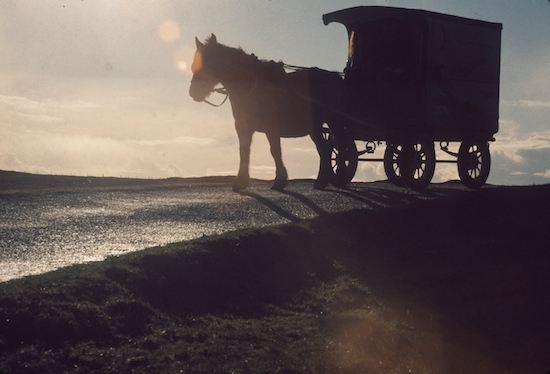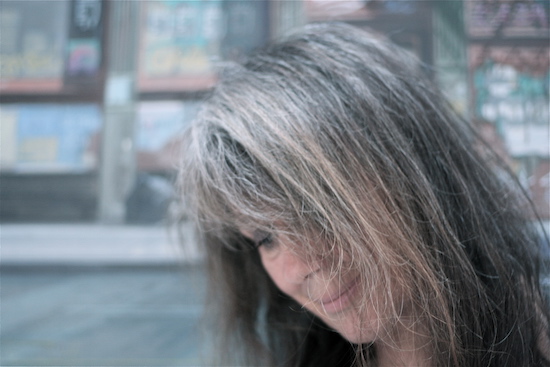Lots Road by Robert Hewison
Pop music doesn’t go in much for redemption as a rule, but Bunyan’s life is – characteristically – resolutely atypical. She seems like Hermione, Leontes’ wife in The Winters’ Tale, turned to stone for twenty years and then returned, movingly, to life.
If you’re reading this, the chances are that you’re familiar with the outlines of Vashti Bunyan’s story. A brief stab at pop stardom in the mid-sixties as an unwilling Marianne Faithful surrogate under the management of Andrew Loog Oldham. A year-long hippy odyssey from London to Skye and beyond in a horse and cart followed by a single, wildly unsuccessful LP recorded through the auspices of Joe Boyd. Then retreat and a 30-year silence during which, unbeknownst to Bunyan, a transatlantic fanbase slowly grew and copies of that LP, Just Another Diamond Day, began to trade at ridiculous prices. And, at last, an astonishing second coming: the reissue of the LP in 2000 with two further albums following, high-profile concerts with famous alumni in support, and even that great marker of 21st-century success, the use of a song in a major corporate advertising campaign – in Bunyan’s case, T-Mobile.
But if there are myths to be woven about her life – both about that epic hippy journey of societal rejection in 1968–9 and about her late-flowering creative success – Bunyan isn’t much interested in weaving them herself. Although the body of the book is taken up with the trek to the Outer Isles – she and her partner Robert Lewis ultimately tried to make a home on the Isle of Berneray – there is nothing romantic or romanticised in her telling of it.
The songs of Just Another Diamond Day were written out of the experience, but, on this account, they seem to have been written as much as a defence against the reality of it as a celebration of the free spiritedness it embodied. In From Here to Before, the superb 2008 documentary about her travels, Bunyan told film-maker Kieran Evans, “The songs represented the dream. They didn’t represent the reality.” Here, in Wayward, she gives us the reality.
It isn’t all grim. The reality includes moments of wonder and small epiphanies about the natural world. But that’s balanced by very real hardships: a diet of porridge and brown rice, onions and cabbage stolen from allotments, the occasional gift of eggs and apples, and the dismal cold unwelcomeness that greets itinerant people everywhere. Along the way they learned to divide people – even whole communities – into ‘yes’ and ‘no’ people. The latter predominate. But they found kindness too, particularly from other marginal, transient folk – Romanies, rag-and-bone merchants, and so on. Other benefactors included the Lairds of the Isle of North Uist and the Sheriff of Westmoreland. Bunyan is more aware now than she was of the privileges their class allowed them along the road.

Wagon silhouette by CS Sykes
But, for Bunyan at least, theirs was not a dilettante jaunt before returning to the comforts of modernity. “I was not making any kind of statement,” she writes, and it is easy to believe her. She seems to have been too lost for that. The journey narrative, and the personality revealed by that narrative, made this reader think of Billy Pilgrim in Kurt Vonnegut’s Slaughterhouse Five, a man so traumatised by war he is wrenched out of time entirely. It’s not an analogy to be pressed too far, but the sense of someone more or less entirely unmoored, in both good ways and bad, is hard to shake. Someone else, in her own way, searching for a world that existed outside of time, a fantasy of life without modernity.
Much emotional turmoil is glimpsed. More is elided. This is surely both a creative and a psychological choice. Late in the book, towards the end of her relationship with Lewis, she writes of a love affair that might have been, of someone “I had almost allowed in to the fortress I had always built”. Here and there are flashes of rawer feelings: a moment of doubt and fury in the Scottish Highlands, a stone in the hills above the Perthshire farmhouse they eventually bought to which Bunyan would go to scream out her misery and frustration. You read these passages and you wonder again about that fortress. What it kept out. What it kept down. Might there be another version of this book that is one long roar of anger and pain? What was the sense in it all, she asks herself. Even now, she doesn’t know the answer.
You wonder too, what happened to the young woman, not yet twenty, confident enough to traipse up and down Denmark Street, London’s Tin Pan Alley, singing her songs for prospective managers and agents? What kind of trauma compelled her to go find Lewis, an art student living under canvas beneath a rhododendron bush on Bromley Common, and to embrace his lifestyle, and him? “I must have been in quite a bad way for [it] to have felt great,” Bunyan said of herself in From Here to Before.
Here she is less forthright, but the shape of the trauma is laid out in a few lines. Her hopes of a music career collapsed after several unreleased recording sessions. There were some heartbreaks which are only alluded to (“the little ghosts of lost babies whose stories will never be told”). Her drink was spiked at a party. Librium, Valium and another, unnamed, anti-depressant surely didn’t help. She was consumed by the sense of being “alone [and] petrified on the edge of an abyss … treading a high wire above it, or else falling – with nowhere to land”. Then came a screaming row with her mother, which precipitated a stroke from which her mother never recovered: complications were discovered, complications set it. The loss of her mother – lost twice, really, first to the stroke, after which she didn’t recognise her daughter, and then to death – seems a shadow that never passed.

Vashti Bunyan by Whyn Lewis
Bunyan reproduces the lyrics to a number of her songs throughout. When her mother dies in 1969, we find the lyric to ‘Mother’ from 2014’s Heartleap. The song recalls how, as a child, Bunyan watched her mother dance and sing, “believing herself alone”. It mirrors – uncannily, for this reader – the peculiarly intimate sense of Bunyan’s own music as a private act, something on which the listener is eavesdropping, something to which the listener is irrelevant. It’s one of the reason’s Just Another Diamond Day is so compelling, I think. The songs have the casual power of fleeting thoughts caught in a melody. They are complete in themselves and they don’t need or care about your approval. ‘Mother’ ends with Bunyan turning away, not acknowledging her mother’s happiness and art, just as she herself turned her back on her own music for nearly three decades. Perhaps in returning to it as she has, there is a sense of, if not healing, then a kind of peace, laying a little of that hurt to rest.
Joe Boyd, in his memoir White Bicycles, wrote that when he first heard Bunyan sing at the ICA in Dover Street in 1966, “Her voice was small and delicate, but the quieter she sang the more attentively the audience listened”. Her singing eschews emphasis or grand emotional triggers. It is the sound of someone not trying to be anyone but themselves. In that light, it seems entirely characteristic that she instructed a surprised violinist on Just Another Diamond Day to play without vibrato. Affectlessness defines her style. Wayward has something of the same quality. For all its gentleness and reticence, there is something uncompromising and uncompromised about both her music and the way she writes about her life. The delicacy comes from a place of great resilience. It takes a lot of strength to be fragile in the world.
Before leaving on their journey, Bunyan and Lewis made a bonfire of everything they were leaving behind. Writings. Shoes. Books. Now, she says, she looks back with regret on “all that we lost of our young selves”, but really the journey itself was a kind of bonfire of another sort, this time of Bunyan’s future. Indeed, it’s hard not to read the book and think of the journey as a symptom of Bunyan’s breakdown. She becomes subsumed in the relationship with Lewis, who comes across, even in Bunyan’s restrained telling, as controlling, selfish and self-absorbed. He left her after twenty-two years and multiple infidelities for an actress in London. “Forgiveness is a longer road,” she writes, “but I’ll get there one day.”
Anyone who likes Bunyan’s music will find Wayward immensely rewarding. Its authorial voice, like that of her songwriting, is reflective and gentle. The tone is neither nostalgic nor regretful, but observant, undemonstrative, self aware. Just as her songs create their own quiet space which, through their very unwillingness to project, draws you in, so the narrative here carries you at its own pace and in its own way. The self is beguilingly elusive: not exactly absent, but watching warily from somewhere close by. “A small voice in the loud gale of the sixties,” she says of herself. Much of the gale has blown by, but here she still is, resilient and enduring. She disliked that decade’s fad for the I-Ching, but one phrase stuck in her mind: “perseverance furthers”. So it does.
Wayward by Vashti Bunyan is published by White Rabbite Books



